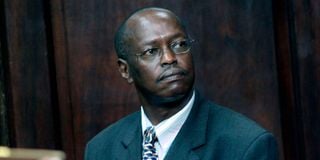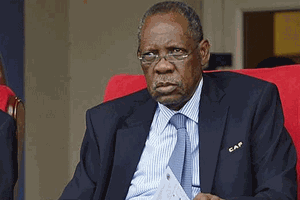
Former Kemri Director Davy Koech during a past appearance in court during the hearing of a graft case against him.
The curtain has fallen on Dr Davy Kiprotich Koech, a pioneer researcher in immunology and molecular medicine who rose to the zenith of his career in medical research before it tumbled like the proverbial house of cards.
Koech’s name was in the 1990s synonymous with Kenya Medical Research Institute (Kemri), an institution he co-founded and became its managing director at the age of 28.
Koech, who breathed his last on Thursday, will go down with a depository of knowledge in the field of science, secret dealings in the corridors of power and a taste of the prison dungeons.
In his 73 years, he literally saw it all. He rose from a rural boy born on August 21, 1951, at Motero Village in Soliat sub location in Soin Sigowet, Kericho County, to the top echelons in academia. He went on to dabble in money and power before he lost it all.
Koech was globally respected for his contribution to research on HIV/Aids and other tropical diseases.
His name is among the 500 Greatest Geniuses of the 21st century and he was nominated in 2006 for Genius Laureate of the American Biographical Institute.
“Dr Koech’s passing is not just a personal loss to his family, but a profound one for the nation and the global scientific community,” said Kericho governor Erick Mutai. “He leaves behind a legacy of innovation, courage and an unshakeable belief in the knowledge of power to transform lives.”
Koech was among individuals who enjoyed the trust of former president Daniel arap Moi and was respected in the corridors of power. He used this to acquire wealth while at the helm of Kemri through political patronage.
With former Lugari Member of Parliament Cyrus Jirongo, they formed Sololo Holdings Limited, which was involved in suspect deals with financial institutions. It also had interests in real estate.
He went on to use Sololo Holdings Limited to acquire 60 per cent shareholding at the iconic Kericho Tea Hotel in another controversial transaction.
Koech cofounded Kemri with Professor Mutuma Mugambi in 1979. Ten years later, he became its managing director while he was a doctoral student at the University of Nairobi. He built it to be an internationally recognised research outfit.
He had an illustrious academic journey and obtained his first degree in chemistry and zoology from the University of Nairobi then a master’s in pharmacology from Duquesne University in Pittsburgh, USA. His PhD was in medical pathology, which he obtained at the University of Nairobi. Koech was also trained at the Harvard Medical School.
He was thrust into the international limelight on June 1, 1990, when Moi announced that Kenya had discovered a drug that would cure HIV/Aids.
Moi said Kemron, the wonder drug, had allegedly cured 10 patients, a position that later became difficult to scientifically prove. Dr Arthur Obel, the chief researcher at Kemri, subsequently teamed up with Dr Koech and published two medical journals on the research outcome.
Moi was to be later embarrassed when the World Health Organisation (WHO) threw Koech and Obel under the bus with a declaration that Kemron was an experimental drug of unproven benefit for HIV/Aids treatment and that it was not the wonder drug it had been touted to be.
Koech ran into trouble in 2009 when he was arrested and charged with corruption for allegedly siphoning Sh19.3 million from Kemri and funnelling it through his personal bank accounts.
The charge sheet said that on August 17, 2006, in Nairobi, he fraudulently acquired Sh800,000 being property of Kemri and that on December 12, 2006, he irregularly acquired Sh6 million and Sh12.5 million from the institute.
In the transactions, he allegedly left a clear paper trail that saw money move from Kemri accounts at Standard Chartered, Kisumu branch to his accounts at the bank’s Yaya Centre branch in the name of African Medical Services Trust (Amset), which he was a founder.

Davy Koech, former Kenya Medical Research Institute (Kemri) director, in the dock at the Milimani Law Courts Nairobi on Wednesday, September 15, 2021.
Koech claimed in court that the money belonged to Centres for Disease Control and Prevention (CDC) and that Kemri had signed a collaborative agreement with Amset on research projects, thus rendering the claim of corruption nugatory.
He claimed to have refunded Sh21.2 million in an arrangement with EACC—comprising the Sh19.3 million in question and Sh3 million in accrued interest. However, the courts stated there was no written agreement to show the commission would not pursue the case after that.
Subsequently, he was jailed in September 2021 after being found guilty of transferring Sh19.3 million from Kemri bank accounts to his personal accounts.
Last year, Dr Koech wrote an emotional letter to President William Ruto seeking pardon through the Advisory Committee on the Power of Mercy. This led to him being released with 37 other prisoners.
His release was effected by a July 2023 notice in the Kenya Gazette by the then Attorney-General Justin Muturi.
In the letter to the President, Koech described his plight at length.
“Your Excellency, I express profuse remorse. I have been punished and have suffered enough, having litigated for 15 years, expending enormous financial resources and time,” he stated.
“I have suffered depression, I am now stuttering in my speech and of diminished cognition,” he added. “Now at 71, and while incarcerated, my health, sir, has deteriorated. I have suffered a severe stroke and I am hypertensive. Medical doctors have determined that I am neither fit to stand further trial nor am I able to instruct my legal counsel. Similarly, I have suffered depression.”

Former Kemri director Davy Koech.
The fallen scientist has been eulogised as a man who dared to dream, one who scaled the heights of his field of profession from the bottom all the way up.
President Moi appointed him the chairman of the 1999 Commission of Inquiry into the Education System which recommended a raft of reforms in the sector in what came to be known as the Dr Koech Report.
Another leader who has eulogised Koech is Senate Majority Leader Aaron Cheruiyot, who termed him an icon.
“(Dr) Koech was a true hero in our community, whose contribution has left an indelible mark in the landscape of scientific research in Kenya,” the Kericho senator.
“His tireless work and dedication to advancing healthcare and science uplifted countless lives, making him a beacon of hope and progress. With his passing, we have lost a giant … whose legacy will continue to inspire and shape our future,” he added.







